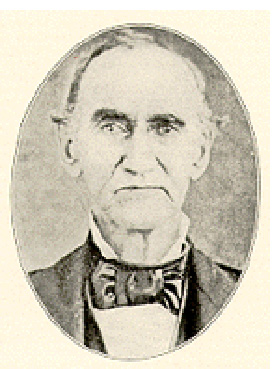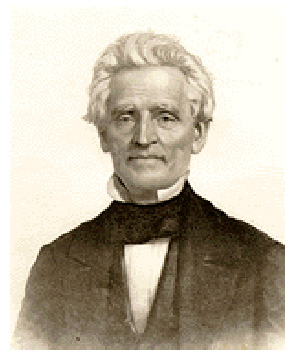An article in the Oct. 9, 1909, issue of Christian Standard was simply titled, “In Memoriam”; beneath it was J. W. McGarvey’s byline followed by an all-cap, body-type-size subhead, “ADDRESS AT THE GRAVES OF KENTUCKY VETERANS.“ The address occurred at The Lexington Cemetery. It began,
“A rather unique exercise during the sessions of the Kentucky Missionary Convention, which adjourned September 24, was a largely attended meeting in the cemetery, and an address by Pres. J. W. McGarvey in memory of the pioneer preachers whose remains are buried there. The meeting was held between the graves of John T. Johnson and John Smith, which are only about fifty steps apart, and the service began at 8:30 a.m. The speaker stood in an open buggy and delivered the following.”
_ _ _
ADDRESS
In Heb. 13:7, the apostle exhorted his brethren: “Remember them who had the rule over you and spoke to you the word of God, and, considering the issue of their lives, imitate their faith.”
It is in the spirit of this exhortation that this meeting was conceived, and that we are here assembled.
I am to speak of the Kentucky pioneer preachers who are buried here, of whom there are eight. To do justice to the memory of any one of them would require the full time of a discourse. I shall, therefore, attempt to mention only their most distinctive characteristics.

John T. Johnson, whose monument stands just behind me, was the first to be laid away here. The leading feature of his career was a burning and absorbing zeal for the conversion of sinners. He inherited a comfortable fortune, and in early life he was a promising lawyer and was elected to Congress; but he abandoned the political career, which opened to him with inviting prospects, that he might give himself to the one work of turning sinners to the Lord. He preached all over Kentucky and in many Southern States with so little regard to selfish aims that he expended in his work the fortune which he inherited. Two incidents, which I will mention, illustrate his zeal for the saving of souls.
It was the custom in his day, especially of country churches, to have a Saturday meeting preceding the one on the Lord’s Day. It was usually attended by a small audience, made up chiefly of church-members. At one of these he closed his discourse, as he always did, with a warm exhortation to sinners, and one young man came forward to confess Christ. He gave another exhortation, and another came forward. Roused by this success, he made a still stronger appeal with the same result. Not satisfied yet, he was about to begin a fourth exhortation, when one of the elders raised his hand and said, “It’s no use, Bro. Johnson; you’ve got the last sinner in the house.”
It was my solemn privilege to sit with some others by his bedside, during the last night of his life. It was in Lexington, Mo. He had gone thither to visit a large number of old friends whom he had baptized in Kentucky, and to hold a protracted meeting. About six inches of snow had fallen, and a cold rain had followed, so the streets were covered with a deep, cold slush. Bro. Johnson was preaching every night, and all day long was walking about in this slush with cold, damp feet, visiting old friends and hunting up sinners who appeared interested in the meeting. The result was a violent attack of pneumonia, under which he rapidly sank. On the last night, though his physicians had given him up to die, and though he lay in a deep stupor, he several times sat up in his bed as straight as an Indian, and, imagining himself in the pulpit with an audience before him, he broke forth in an exhortation to sinners with a voice of almost supernatural strength which could be heard in adjoining dwellings. When exhausted by the effort, he would fall back suddenly on his pillow. Thus did the passion of his life assert itself as death drew near. And what a passion it was!

The second of our honored eight to be laid to rest here was John Smith, whose monument is just before me. He is best known as a humorist. In that respect he was fully the equal, if not the superior, of Abraham Lincoln, whom he excelled in his powers as an orator. So many of his witticisms have been quoted and widely circulated, that many have learned to regard him as a joker more than a preacher. But this is to do him great injustice. Nearly always, whether in the pulpit or in private conversation, his inimitable witticisms were but sparkling preludes to remarks of deep, thrilling solemnity. A smile is always next neighbor to a tear, and very often his audiences were bathed in tears the next moment after a gleam of amusement. Sometimes a remark which caused a ripple of amusement was followed by an overwhelming outburst of fervid eloquence, as a gleam of lightning is followed by heaven-racking peals of thunder.
This rare combination of humor and solemnity was illustrated when he was about to make his last visit to Missouri. His hands were so tremulous with palsy that in traveling, he took with him a negro boy to dress and undress him, and to wait on him at the table. His daughter, with whom he was living, begged him not to undertake the trip, and said: “Father, you might die there.” He answered: “Daughter, do you think that heaven is any farther from Missouri than it is from Kentucky?” He did die in Missouri. His remains were brought to Lexington, and it was my privilege to preach his funeral in the old Main Street Church, after which we laid him in the spot around which you are now standing.
The next of our eight to be mentioned is Thomas Smith, a contemporary and fellow-laborer of John Smith and John T. Johnson. He lived and died in this city. He was not so conspicuous as his two companions, but he was a godly man, full of faith and the Holy Spirit. I have a special personal reason for remembering him, in the fact that he baptized my father in Hopkinsville, Ky., when I was an infant. He left a daughter here, Mrs. Robert Hamilton, whom some of you remember as a venerable and faithful Christian, and her daughter, Miss Mary Susan Hamilton, is still living with us, though an invalid.
R. C. Ricketts comes next on our list. In early life his home was at Maysville, but the chief part of his days was spent at Midway, where he acted for many years as chairman of the board of trustees of the Midway Orphan School, and contributed much to the wise management of that institution. As a preacher he was instructive, and his sermons were chiefly devoted to the edification of the church. At times, however, when aroused by the occasion, he spoke with great power, and sometimes with thrilling eloquence. In his prime he was often engaged with others in successful protracted meetings by which many were brought into the church.
_ _ _
McGarvey will conclude his remarks in our next “Throwback Thursday” feature. He introduced the final four names by saying, “I am now to speak of men who are remembered by the majority of my hearers.” Those four include Robert Milligan, Dr. L. L. Pinkerton, Moses E. Lard (though the editor noted “the speaker’s memory was at fault” and that Lard actually was buried in Missouri), and Robert Graham.

This visitation of McGarvey’s Throwback Thursday remarks has rekindled memories of my own educational experiences at Louisville Bible College, listening to the remembrances of Professors Henry Glenn Davis, Frank Buck, Hansel Eason and others of men like John T. Johnson, John Smith, Moses Lard and even of J.W. McGarvey himself. Thank you for inspiring a pleasurable flashback to our earlier times!